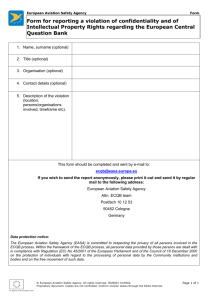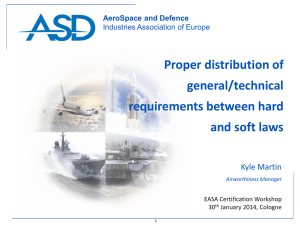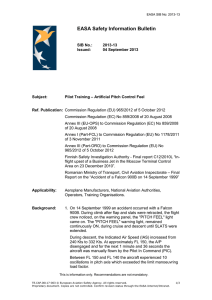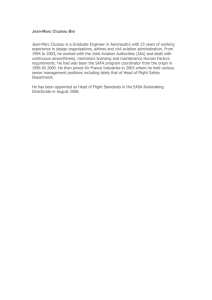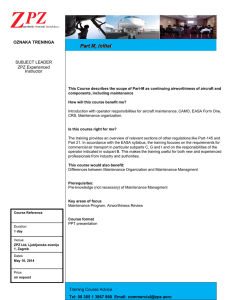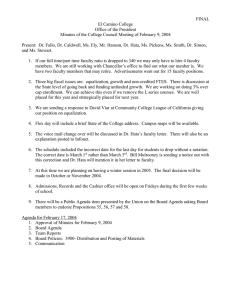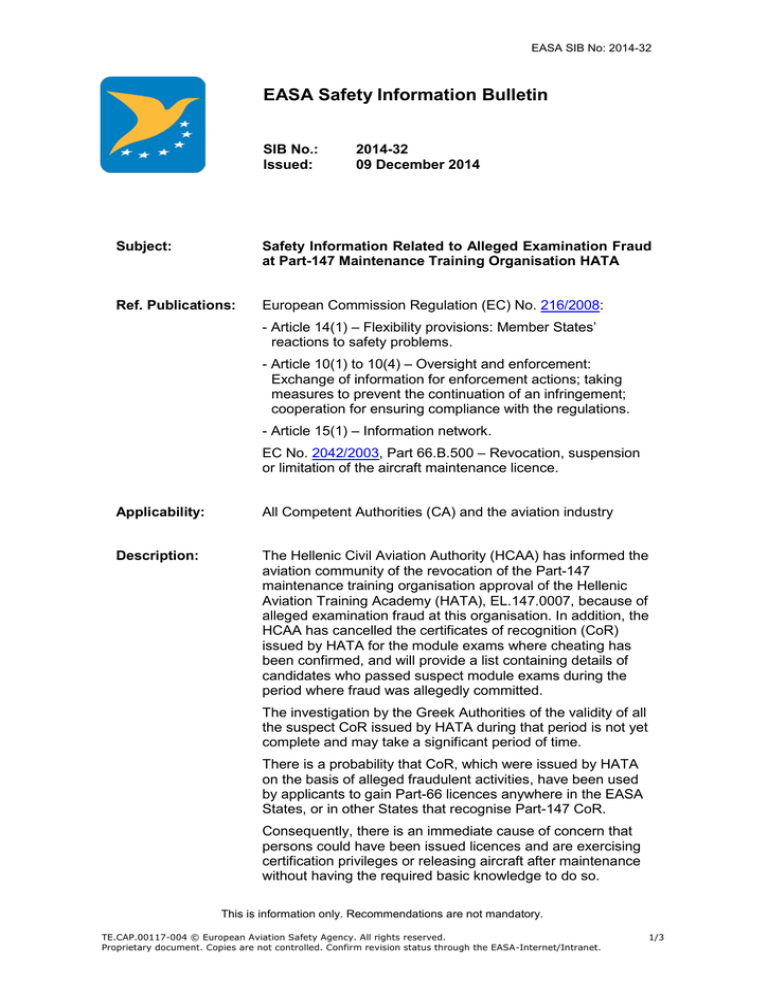
EASA SIB No: 2014-32
EASA Safety Information Bulletin
SIB No.:
Issued:
2014-32
09 December 2014
Subject:
Safety Information Related to Alleged Examination Fraud
at Part-147 Maintenance Training Organisation HATA
Ref. Publications:
European Commission Regulation (EC) No. 216/2008:
- Article 14(1) – Flexibility provisions: Member States’
reactions to safety problems.
- Article 10(1) to 10(4) – Oversight and enforcement:
Exchange of information for enforcement actions; taking
measures to prevent the continuation of an infringement;
cooperation for ensuring compliance with the regulations.
- Article 15(1) – Information network.
EC No. 2042/2003, Part 66.B.500 – Revocation, suspension
or limitation of the aircraft maintenance licence.
Applicability:
All Competent Authorities (CA) and the aviation industry
Description:
The Hellenic Civil Aviation Authority (HCAA) has informed the
aviation community of the revocation of the Part-147
maintenance training organisation approval of the Hellenic
Aviation Training Academy (HATA), EL.147.0007, because of
alleged examination fraud at this organisation. In addition, the
HCAA has cancelled the certificates of recognition (CoR)
issued by HATA for the module exams where cheating has
been confirmed, and will provide a list containing details of
candidates who passed suspect module exams during the
period where fraud was allegedly committed.
The investigation by the Greek Authorities of the validity of all
the suspect CoR issued by HATA during that period is not yet
complete and may take a significant period of time.
There is a probability that CoR, which were issued by HATA
on the basis of alleged fraudulent activities, have been used
by applicants to gain Part-66 licences anywhere in the EASA
States, or in other States that recognise Part-147 CoR.
Consequently, there is an immediate cause of concern that
persons could have been issued licences and are exercising
certification privileges or releasing aircraft after maintenance
without having the required basic knowledge to do so.
This is information only. Recommendations are not mandatory.
TE.CAP.00117-004 © European Aviation Safety Agency. All rights reserved.
Proprietary document. Copies are not controlled. Confirm revision status through the EASA-Internet/Intranet.
1/3
EASA SIB No: 2014-32
Due to the potential deficit in aircraft basic knowledge of the
affected licence holders, EASA qualifies this situation as a
potential safety issue which poses a clear safety risk and
could lead to unsafe conditions.
Under European Commission Regulation (EC) No. 216/2008,
in particular Art. 10 and 15 thereof and its implementing rules,
namely European Commission Regulation (EC) No.
2042/2003, Member States have the obligation to investigate
potential safety issues and take any measure to prevent the
continuation of an infringement.
This Safety Information Bulletin provides guidance to Member
States’ CA and to the aviation industry of methods that can be
used to address this potential safety issue.
The guidance is not only relevant to address the specific
HATA situation, but may also be used in similar situations in
the future.
Recommendation(s): Specifically for the subject addressed by this SIB, EASA
makes the following recommendations:
The CA who have issued Part-66 licences, or have
applications for Part-66 licences, should:
•
Check if any Part-66 licences have been issued based on
CoR issued by HATA. As a reference the CA may use the
list of candidates provided by the HCAA and the CA
should contact the HCAA to get more information on the
individual cases concerned, if required.
•
Investigate in accordance with the respective national law,
the knowledge levels of the candidates or licence holders
whose licences were issued based on a HATA CoR to
determine whether the required level of knowledge exists,
or if fraud has taken place. This investigation could take
any form, such as: proving the knowledge levels of one or
more of the module examinations; interviews with the
candidate; reports from the employer of the candidate;
judicial investigations of the candidate.
•
If necessary and in accordance with national law, cancel
the affected CoR using the provisions of Article 14.1 of the
Basic Regulation, and inform other CA, EASA and the
European Commission accordingly, if investigations
reveal that a licence holder has insufficient basic
knowledge to hold a particular CoR, or if the investigations
confirm cheating or fraud took place.
•
If necessary, revoke, suspend or limit the individual Part66 licence in accordance with 66.B.500 of Annex III
(Part-66) to European Commission Regulation (EC)
No. 2042/2003.
•
Inform the CA of the Part-147 organisation of the
candidates and examinations affected, so this information
can be shared by that CA with the community.
This is information only. Recommendations are not mandatory.
TE.CAP.00117-004 © European Aviation Safety Agency. All rights reserved.
Proprietary document. Copies are not controlled. Confirm revision status through the EASA-Internet/Intranet.
2/3
EASA SIB No: 2014-32
In general, EASA recommends CA and industry to closely
observe the following:
The CA of any Part-147 organisation should carry out a
coordinating role, to publically inform the aviation industry,
other CA, EASA and the European Commission of:
•
Any confirmed cases of cheating in individual
examinations;
•
Details of candidates who have been issued CoR during
the time period where fraud or cheating was suspected;
•
Information coming from the licensing CA on: candidates,
examination sessions, and Part-147 organisations, where
the candidates have been proven not to have the required
level of knowledge, or where cheating has been confirmed
by investigations conducted by the licensing CA (e.g.
‘cheating was confirmed in examination session xxx
[where xxx identifies the examination session]’; or
‘persons sitting exams in ppp [where ppp identifies the
exam location] on dd/mm/yyyy have been confirmed as
not having the required knowledge levels’).
Persons working in the aviation industry should:
Contact(s):
•
Report to their CA all suspicions regarding fraud,
cheating, knowledge levels of Part-66 licence holders, or
the validity of Part-147 examinations;
•
Assist their CA in investigation of the knowledge /
competence levels of Part-66 licence holders.
For further information contact the Safety Information Section,
Certification Directorate, EASA. E-mail: ADs@easa.europa.eu
This is information only. Recommendations are not mandatory.
TE.CAP.00117-004 © European Aviation Safety Agency. All rights reserved.
Proprietary document. Copies are not controlled. Confirm revision status through the EASA-Internet/Intranet.
3/3

